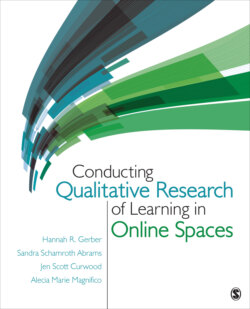Читать книгу Conducting Qualitative Research of Learning in Online Spaces - Hannah R. Gerber - Страница 21
На сайте Литреса книга снята с продажи.
Phenomenology
ОглавлениеPhenomenology is rooted in the work of German philosopher Edmund Husserl and is focused on understanding the lived experience of participants in relation to a given phenomenon. For example, Leander and Boldt’s (2013) account of two children playing with manga stories, related toys, and trading cards showed how literacy activities may not always be deliberately designed, but may be improvisational and responsive to current, changing emotions and play conditions. Similarly, Wargo (2015) documented how a participant used smartphone apps like Snapchat and Map My Walk, as well as the gestures that dictate their use (e.g., swiping, tapping), to create, re-create, compose, and share experiential narratives.
According to Creswell (2013) there are two types of phenomenology: hermeneutical phenomenology (van Manen, 1990) and transcendental phenomenology (Moustakas, 1994). Hermeneutical phenomenology is oriented toward understanding the lived experiences by researching the texts of life, which are referred to as the hermeneutics. According to the approach used by Max van Manen, researchers first identify a phenomenon, reflect on essential themes, and maintain a personal connection to these happenings. In their study of the online educators’ experiences, De Gagne and Walters (2010) employed a hermeneutic phenomenological approach in order to gain insight into participants’ narrative accounts. This allowed for a reflection on “how they interpret and express their experiences through interviews” (Polit & Beck, 2004, p. 358).
Given that “phenomenology is not only a description, but also an interpretive process in which the research makes an interpretation... of the meaning of the lived experiences” (Creswell, 2013, p. 80), Clark Moustakas’s transcendental phenomenology seeks to keep researchers’ interpretations separate from the data. In so doing, transcendental phenomenology begins with researchers “describing their own experiences with the phenomenon and bracketing out their views before proceeding with the experiences of others” (Creswell, 2013, p. 80), thereby acknowledging preconceptions prior to data collection and analysis.
